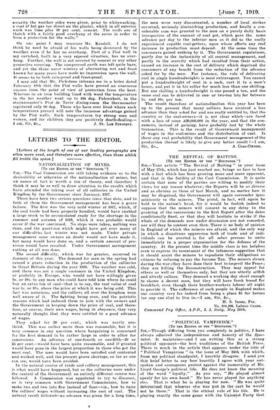LETTERS TO THE EDITOR.
[Letters of the length of one of our leading paragraphs are often more read, and therefore more effective, than those which
till treble the space.] -- NATIONALIZATION OF MINES.
ITo THE EDITOR or THE " SPECTATOR.") SIR.,—Tbe Coal Commission are still taking evidence as to the desirability or otherwise of the nationalization of mines, but an ounce of fact is worth a ton of theory, and therefore I think it may be as well to draw attention to the results which bare attended the taking over of all collieries in the United Kingdom by the Government since January, 1917.
There have been two serious questions since that date, and in both of them the Government management has been a grave failure. The first was the very mild winter of 1917, which, if the coal trade had been properly handled, would have enabled a large stock to be accumulated ready for the shortage in the summer and autumn of 1918, which it was probable would occur if the war continued. No steps were taken, nothing was done, and the provision which might have got over many of our difficulties last winter was not made. Under private management some owners no doubt would not have made it, but many would have done so, and a certain amount of pro- vision would have resulted. Under Government management nothing at all was done.
The second difficulty, which was far greater, occurred in January of this year. The demand for men in the spring had caused a grave reduction in the production of the collieries in Great Britain during the year 1918. The weather was cold, and there was not a single customer in the United Kingdom, or probably in Europe, who would not have willingly given Is. or 10s. to any man who could have told him where he could buy an extra ton of coal—that is to say, the real value of coal was 5s. or Its. above the price at which it was being sold. This fact was notorious, and the colliers all over the kingdom were well aware of it. The fighting being over, and the patriotic reasons which had induced them to join with the owners and the Government. in keeping down the price of coal, and there- fore, of course, their own wages, being in abeyance; they very naturally thought that they were entitled to a good advance of wages.
They asked for 30 per cent., which was nearly one- third. This was rather more than was reasonable, but it is very common in any question where bargaining is concerned for the first demand to be rather large in order to allow for concessions. An advance of one-fourth or one-fifth-20 or 2.5 per cent.—would have been quite reasonable, and if granted would have gone in the largest proportion to those who got the most coal. The men would have been satisfied and contented and worked well, and the present grave shortage, so far as one can see, would have been avoided.
In the natural course of trade and colliery management, this is what would have happened, but as the collieries were under the control of the Government an entirely different course was followed. A Commission woe appointed to try to discover, as is very common with Government Commissions, how to make two and two into five instead of four—yin., how to raise the colliers' wages without increasing -the cost of coal. The natural result followed—no-advance was given for a long time,
the men were very discontented, a number,of local, strikes occurred, seriously diminishing production, and finally a con- siderable sum was granted to the men on a purely daily basis irrespective of the amount of coal got, which gave the same advance per day to the inferior men as it. did to the really experienced capable coal-getters, upon whose efforts any real increase in production must depend. At the some time the consumers gained nothing by it. The Government regulatione, partly due to the inelasticity of all central management, and partly to the scarcity which had resulted from their action, caused an increase in the cost of delivery which deprived the consumers of any benefit from the reduction of the advance asked for by the men. For instance, the rule of delivering coal in single hundredweights is most extravagant. You cannot put a hundredweight of coal in a sack, cart it to a man's house, and put it in his cellar for much lees than one chilling. But one shilling a hundredweight is one pound a ton, and the some coal can be delivered in one- or two-ton lots for between 5s. and 10s. per ton.
The result therefore of nationalisation this year has been up to the present that many colliers have received a less advance than they asked for and are really entitled to, that the country or the coal-owners—it is not clear which—are faced with a loss of some .220,000,000 in the year, and that the con- sumers, instead of gaining, have probably lost by the whole transaction. This is the result of GovernMent management of wages in the coal-mines and the distribution of coal. Is there any real probability that Government management of the production thereof is likely to give any better result ?—I am,


































 Previous page
Previous page